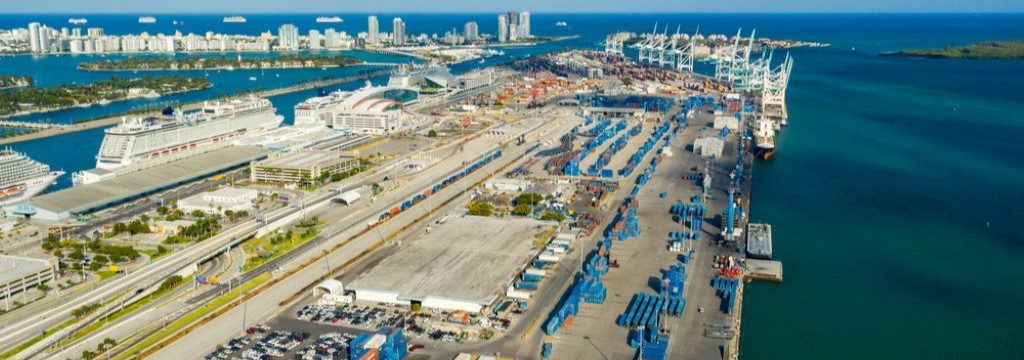Florida Ports Flourishing
- Home
- Latest News
- Florida Ports Flourishing

Cargo and cruise traffic hit record highs last year at Florida seaports, which took advantage of global supply chain issues and a desire by people to travel as COVID-19 pandemic restrictions waned, according to an industry report that was just released.
The annual Seaport Mission Plan by the Florida Ports Council said 10 port facilities handled 114.25 million tons of cargo in 2023, up 1.5% from a record 112.5 million tons in 2022.
“We have purposely gone out and told vessels to change their course and to pick Florida as their destination for cargo. And they have,” Florida Ports Council President and CEO Mike Rubin said.
Rubin pointed to efforts to promote Florida ports as an alternative when demand surged for goods during the pandemic and supply chain issues and a desire by people to travel as COVID-19 pandemic restrictions waned, according to the industry report.
The annual Seaport Mission Plan by the Florida Ports Council said 10 port facilities handled 114.25 million tons of cargo in 2023, up 1.5% from a record 112.5 million tons in 2022.
“We have purposely gone out and told vessels to change their course and to pick Florida as their destination for cargo. And they have,” Florida Ports Council President and CEO Mike Rubin said.
Rubin pointed to efforts to promote Florida ports as an alternative when demand surged for goods during the pandemic and supply chain problems included clogged shipping at California ports. The report said Florida was prepared to handle an influx of ship traffic by having ports linked closely to roads, rail and air facilities.
“Florida also could be benefiting from global conflicts in areas such as the Middle East,” Rubin said. “Maersk, CMA CGM and others (shipping companies) are coming out of either the Suez Canal, the Panama Canal or around Cape Horn, to avoid some of those (global) hotspots. We are either the first stop or one of the last stops when that vessel is dropping off its cargo. And that’s good to see. I think we’ve proven that Florida is the place to seize the opportunity for your cargo growth.”
Meanwhile, seven Florida ports counted 19.4 million cruise passengers last year, topping the previous record by more than 1 million people. That record was set in 2019, the last full year before the pandemic temporarily shut down the cruise industry.
“COVID really did a number to people,” Rubin said. “Everybody was like ready to travel and spend some money on it, and the cruise industry is thankful for it. There was a year where they were struggling.”
The pandemic cut cruise passenger numbers in Florida to 747,488 in 2021, before increasing to 10.8 million passengers as the industry started to rebound in 2022.
PortMiami, Port Canaveral and Port Everglades are the top three cruise home ports in the world. PortMiami last year led with just under 7.3 million cruise passengers, followed by Port Canaveral at 6.92 million and Port Everglades at just over 3 million.
Rubin said he expects those numbers to continue to increase, pointing, for example, to a new Royal Caribbean ship joining the fleet out of PortMiami.
The annual report came as the Florida Ports Council has been seeking additional money from the Legislature for ports.
“We continue to press that if you give more money to your ports, the better off your supply chain will be,” Rubin said. “We’ve got several lists of projects we would hope the Legislature and the governor’s office — when they’re looking at investments of money into the transportation system — that they’ll expand their investments.”
Rubin has pointed to Texas putting forward $200 million into port projects and Georgia trying to centralize auto imports, which would be a threat to Jacksonville as JAXPORT has been moving half a million vehicles a year.
Florida has 16 ports, including the 10 that handle cargo. The report outlines more than $5 billion in capital improvements projects over the next five years focused on dock rehabilitation, port capacity and congestion relief.
A list included 15 cargo projects, with a cost of $325.8 million, that could be underway in the next two years, from $65 million for crane improvements at Port Everglades to $1.5 million to bulkhead replacement at Port Putnam.
Initial House and Senate budget proposals released last week would provide about $110 million for ports. For more than a decade, Florida has provided about $135 million to $149 million annually for port projects.
Source: Florida Weekly
